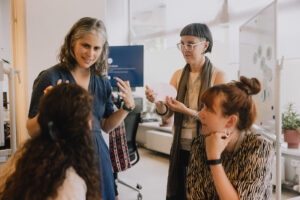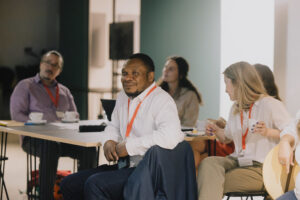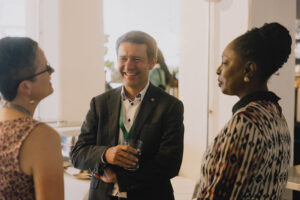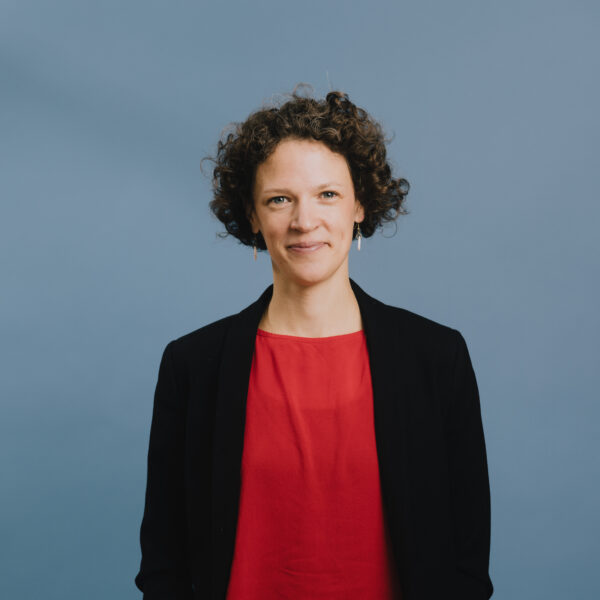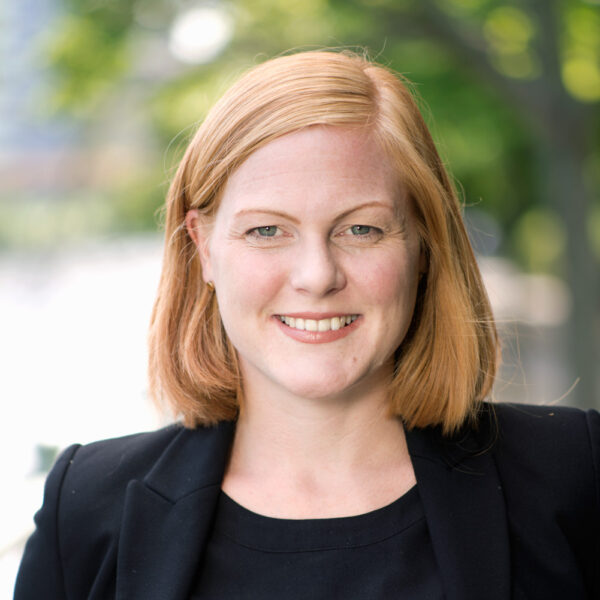For the first time in four years, the Centre convened its Leading Together conference in person again. Leading Together is our annual space for the global directors of the ICSO divisions of Human Resources, Policy/Advocacy, and Programmes. These groups have parallel peer group discussions as well as joint sessions over topics that concern them all. This year, the Scanning the Horizon community of futures-focused senior sector professionals also joined the group. We were thrilled to welcome participants on our home turf in Berlin and spend 48h learning, debating, and reflecting. The Centre team is busily following up on those 47+ items/ideas/insights generated during the event, and we would also like to share three insights that were key to us:
1. Exercising that anticipatory muscle is challenging, liberating – and necessary
At Global Perspectives 2022, we heard and stressed how anticipatory capacity in (I)CSOs is a collective muscle we need to exercise constantly. We took this advice and focused peer and joint sessions on this topic: Discussions with Russell Reynolds on the role of leadership and using AI for the good of ICSOs as well as shaping the future through participatory strategy making were sessions where participants engaged with trends and how to “organise futures”. The Policy/Advocacy Directors discussed with David Griffiths, Associate Fellow at Chatham House the future of the Human Rights diplomacy.
We also really challenged participants with some freshly generated scenarios created in a collective exercise (ParEvo) the Centre has just concluded. Participants had to discuss and reflect on how civil society (organisations) might deal with and shape civil society space after a series of mega-tsunamis hit the world and severed all IT infrastructure. While some scenarios stretched the goodwill of participants to further consider, the exercise was highlighted by many as important to encourage imagining futures differently. A series of mega-tsunamis will throw the world into disarray (not unlike a global pandemic) and might need primarily our crisis-response capacity. However, spending time on creating long-term visions for different futures can put us as civil society sector professionals in a different kind of driving seat versus racing to manage with futures narratives others – usually more powerful actors – are creating.
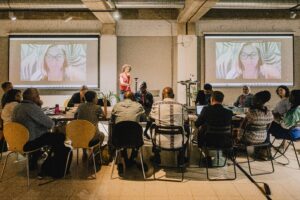
2. Taking time for nuance and learning advances us collectively
What was particularly enriching at this year’s conference was the participants’ willingness to engage in the substance of discussions and openness to critical challenges, and generally a learning mentality. We tried not to gloss over differences with buzzword definitions like “power shift” or “decolonising” but acknowledged the complexity of the matters we deal with and that we may get some things right and others wrong along the journey. Similarly, a joint discussion between the Programme and the Policy/Advocacy directors in exchange with AWID over anti-rights groups and the threat they pose to civic space was exemplary for constructive engagement: Participants brought so much nuance to the discussion and – it might sound like a cliché – embraced the diversity of viewpoints and created patience for understanding our individual or organisational contexts. These high-quality discussions were incredibly enriching and displayed a high degree of collective responsibility for advancing as a sector.
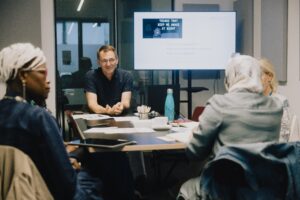
3. Our organisations are shifting fundamentally – from strategy making to recruitment processes – and peer support may just help keep the head above water
A few years back someone said “’powershift’ is the water we all swim in”. This was certainly true for Leading Together. In so many sessions participants explored topics that come from our journeys to become organisations that are at least more power-aware or even mirror a decolonised, equitable and just society that we want to see. It was hugely encouraging to see the spread of organisational initiatives and the degree to which ambitions for change are permeating the organisations: to learn from the experience of WaterAid’s participatory strategy making journey, engage with Superrr Lab in what it takes to break western-centred views of futures making. In similar vein, Mission Talent and the cohort of Human Resources directors discussed the challenges and possibilities our changing sector holds to build more diverse organisations; the Programme Directors explored with Comic Relief what ways there are to work differently with bilateral donors to enable more equitable partnerships; and the Policy/Advocacy Directors are already experienced how shifting mandates of ICSOs hold increased expectations for their departments. Senior leaders from the ICSOs are demonstrating resolve and yet acknowledge that these are unchartered waters where peer exchange, inspiration and support is just what you need.
If you are also an ICSO senior leader and you want to learn more about our offer, do reach out. We already look forward to the next round of Leading Together in 2024 – online – and in-person in 2025!
